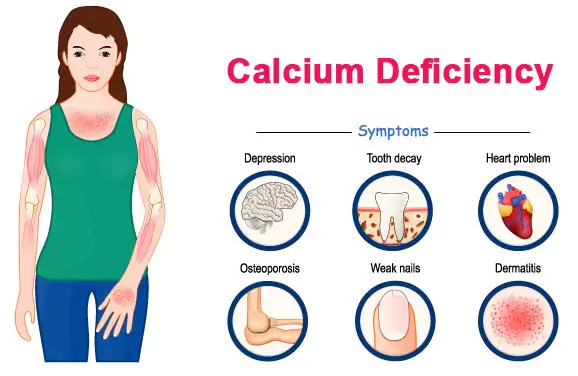Calcium Deficiency
7 Symptoms of Calcium Deficiency in Adults.
Calcium is a crucial mineral that plays a vital role in maintaining overall health and well-being. From supporting bone health to aiding muscle function, this mineral is indispensable for various bodily functions. In this article, we’ll delve into the symptoms of calcium deficiency in adults, shedding light on why it’s essential to address this issue promptly.
The Role of Calcium in the Body
Before we explore the symptoms of calcium deficiency, let’s understand why calcium is so crucial for our bodies. Calcium is not only the building block for strong bones and teeth but also plays a key role in nerve transmission, muscle function, and blood clotting.
Common Dietary Sources of Calcium
To ensure you’re getting an adequate amount of calcium, it’s essential to include calcium-rich foods in your diet. Dairy products like milk, cheese, and yogurt are well-known sources, but green leafy vegetables, nuts, and certain fortified foods also contribute to your calcium intake.
Symptoms of Calcium Deficiency

Muscle Cramps and Spasms
One of the earliest signs of calcium deficiency is muscle cramps and spasms. These occur when there’s not enough calcium to support proper muscle contraction and relaxation.
Fatigue and Weakness
Inadequate calcium levels can lead to fatigue and weakness, impacting your overall energy levels and physical performance.
Osteoporosis
A more severe consequence of prolonged calcium deficiency is osteoporosis, a condition where bones become weak and brittle, increasing the risk of fractures.
Dental Problems
Calcium is crucial for maintaining strong teeth. Deficiency can lead to dental issues such as cavities and gum diseases.
Numbness and Tingling
Insufficient calcium can affect nerve function, causing sensations of numbness and tingling, particularly in the hands and feet.
Cognitive Impairment
Calcium is essential for neurotransmitter release. Deficiency may impact cognitive function, leading to memory issues and difficulty concentrating.
Cardiovascular Issues
Calcium is involved in maintaining a regular heartbeat. Low levels can contribute to cardiovascular problems, emphasizing the need for adequate intake.


Causes of Calcium Deficiency
Various factors can contribute to calcium deficiency, including an inadequate diet, vitamin D deficiency, certain medical conditions, and medications that interfere with calcium absorption.
Who is at Risk?
Certain demographic groups, such as postmenopausal women, individuals with lactose intolerance, and those with malabsorption issues, are more susceptible to calcium deficiency.
Preventing Calcium Deficiency
To maintain optimal calcium levels, it’s crucial to consume a well-balanced diet, including calcium-rich foods. Supplements can be considered under the guidance of healthcare professionals.
Importance of Ayurvedic Solutions
In addressing health issues, including calcium deficiency, Ayurveda offers holistic approaches that focus on overall well-being rather than just symptom management.
Ayurvedic Approach to Calcium Deficiency
Ayurveda emphasizes a balanced lifestyle, including dietary recommendations, herbal remedies, and practices like yoga, to address calcium deficiency and promote overall health.
Our Herbal E-commerce Store
For those seeking Ayurvedic solutions, our herbal e-commerce store offers a range of products specifically formulated to address various health concerns. From supplements promoting bone health to remedies for muscle spasms, we have a holistic approach to well-being.
Ayurvedic Consultations for Health Problems
If you’re facing specific health challenges, our Ayurvedic consultations provide personalized advice and treatment plans tailored to your individual needs. Our experienced practitioners are dedicated to guiding you on your journey to better health.
Testimonials and Success Stories
Many individuals have experienced positive outcomes through our Ayurvedic products and consultations. Read their testimonials to understand how Ayurveda has made a difference in their lives.
Conclusion
In conclusion, recognizing and addressing calcium deficiency is crucial for maintaining optimal health. Whether through dietary adjustments, supplements, or embracing Ayurvedic solutions, taking proactive steps can make a significant difference in your well-being.
Frequently Asked Questions

How can I increase my calcium intake naturally?
- Focus on a balanced diet with dairy, leafy greens, and fortified foods. Consider supplements under professional guidance.
Is Ayurveda safe for addressing health issues?
- Yes, Ayurveda takes a holistic approach, emphasizing natural remedies and lifestyle adjustments, guided by experienced practitioners.
Are there any side effects of Ayurvedic products?
- Our products are formulated with natural ingredients, minimizing the risk of side effects. Consultation with our practitioners ensures safety.
How soon can I expect results from Ayurvedic treatments?
- Results vary based on individual factors, but many experience positive changes within a few weeks of adopting Ayurvedic practices.
Can Ayurveda help with chronic health conditions?
- Ayurveda offers holistic support for various chronic conditions. Consult our practitioners for personalized guidance.

